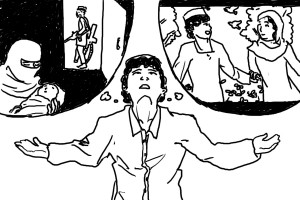Using culture as a secret weapon in war
Art has the power to encourage people, universities and even nations to change their ways. It has the power to introduce new ideas — ideas that lead to unlimited change and transformation. As military and diplomatic efforts are beginning to fail in the war-torn nation of Afghanistan, the powerful force of art is taking its best shot at reforming the nation into a peaceful, modern state.
A new influence is beginning to take root in Afghanistan. It’s not a political figure, religious leader, ideology or even an organization. It’s Bollywood — the musical and fantasy-like Indian movie industry.
Images of love-stricken couples dancing in mountains singing in high-pitched voices and manly heroes saving innocent young women from the clutches of evil-looking villains fill the screen at the movie theaters still operating in Afghanistan.
At first glance, many might shrug their shoulders and wonder why Bollywood’s increased presence is a big deal. The most immediate reason is that young men in their 20s usually fill up the seats — men that can’t find work and are looking for a place to spend their time. Radical preachers and militants find easy recruits in idle men who are frustrated with their socioeconomic positions, thereby making Bollywood an alternative (but temporary) refuge for those upset with their present conditions.
Bollywood provides these men with not only a hobby that doesn’t lead to radicalization but also a window for them to witness the world beyond their war-torn homes — a modern world in which people live comfortably with modern amenities, safety and food.
Under the Taliban regime, Bollywood movies were banned in the nation. Following the militia’s collapse in 2001, however, Bollywood movies and music were the first to make their way into Afghan marketplaces. Accused of being anti-Islamic because they show women without hijabs (traditional head coverings), men and women interacting in public and on-screen singing and dancing, Bollywood movies were seen as a threat to Taliban rule.
By viewing the possibilities and rewards of modernism in Bollywood movies, some believe the movies could play a role in motivating young Afghans to work harder in improving their nation and bringing it up to par with other developing nations in the region. According to some experts, Bollywood offers Afghans a glimpse of what a modern Afghanistan could look like — an image that appeals to the vast majority of average Afghans.
Another practical benefit to Afghans is that Bollywood producers have indicated they might consider Afghanistan as a possible location to shoot songs that are set in natural settings. Bollywood, which produces an average of 1,000 movies per year, routinely films in environments such as the snow-capped mountains of Switzerland, beaches of South Africa, the deserts of Egypt and the tropical rainforests of Indonesia. Afghanistan has a vast selection of natural wonders ranging from mountains to deserts, leading many Bollywood directors to consider traveling to the nation for movie shooting. It is a lot cheaper than other nations, and geographically it isn’t that far from India. This would provide many jobs to local Afghans — something the nation desperately needs.
However, Bollywood’s future could have some hurdles to cross before it stays for good. Recently, the Afghan parliament began to encourage the ban of Indian soap operas in Afghanistan because of reasons similar to the Taliban’s ban years earlier. They pointed toward the women who weren’t fully covered, singing and other so-called “anti-Islamic” qualities of the soap operas. Several presidents of various T.V. channels, as well as the public, have voiced dissent, but it appears as though their voices will be quelled.
Though it is true that the banning of Indian soap operas can be interpreted as a threat to Afghanistan’s journey to modernity, it can also be looked upon as evidence that the power of art — in this case cinema — is beginning to have a significant enough impact on the thoughts of the population that the more stringent Islamic members of parliament are voicing their concern.
It is imperative that the United States, along with non-governmental organizations and other concerned groups, continue to advocate for Bollywood and other foreign art forms to be freely displayed in Afghanistan. Its impact on the lives of average citizens cannot be underestimated.
Art has the power to influence individuals and introduce them to different lifestyles, points of view and belief systems that previously would have remained unknown.
The art of Bollywood is beginning to take root and have effect on the ideas of many young Afghans, thereby planting the seeds of ideological change in the future.
Angad Singh is a sophomore majoring in communication and international relations.

